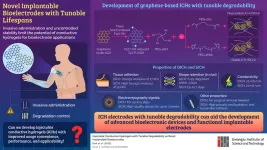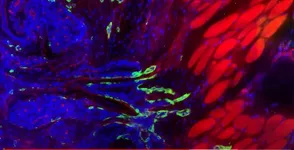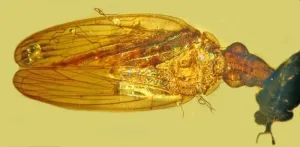Gwangju Institute of Science and Technology researchers develop injectable bioelectrodes with tunable lifetimes
The new graphene-based conductive hydrogel electrodes offer convenience of use, controllable degradation, and excellent signal transmission
2023-05-10
(Press-News.org) Implantable bioelectrodes are electronic devices that can monitor or stimulate biological activity by transmitting signals to and from living biological systems. Such devices can be fabricated using various materials and techniques. But, because of their intimate contact and interactions with living tissues, selection of the right material for performance and biocompatibility is crucial. In recent times, conductible hydrogels have attracted great attention as bioelectrode materials owing to their flexibility, compatibility, and excellent interaction ability. However, the absence of injectability and degradability in conventional conductive hydrogels limits their convenience of use and performance in biological systems.
Against this backdrop, researchers from Korea have now developed graphene-based conductive hydrogels possessing injectability and tunable degradability, furthering the design and development of advanced bioelectrodes. The study was led by Professor Jae Young Lee from Gwangju Institute of Science and Technology (GIST) and was published in the Small journal on 24 February 2023.
Explaining the rationale for their study, Prof. Lee says, “Traditional implantable electrodes frequently cause several problems, such as large incision for implantation and uncontrolled stability in the body. In contrast, conductive hydrogel materials allow minimally invasive delivery and control over the bioelectrode’s functional in vivo lifespan and are thus highly desired.”
To synthesize the injectable conductive hydrogels (ICHs), the researchers used thiol-functionalized reduced graphene oxide (F-rGO) as the conductive component due to its large surface area and excellent electrical and mechanical properties. They selected dimaleimide (PEG-2Mal)- and diacrylate (PEG-2Ac)-functionalized polyethylene glycol as prepolymers to facilitate the development of ICHs that are stable and hydrolysable, respectively. These prepolymers were then subjected to thiol-ene reactions with poly (ethylene glycol)-tetrathiol (PEG-4SH) and F-rGO.
ICHs made with PEG-2Ac were degradable (DICH), while those with PEG-2Mal were stable (SICH). The researchers found that the novel ICHs outperformed various existing ones by binding extremely well to tissues and recording the highest signals. Under in vitro conditions (outside a living organism), SICH did not degrade for a month, while DICH showed gradual degradation from the third day onwards.
When implanted onto mouse skin, DICH disappeared after three days of administration, whereas SICH retained its shape for up to 7 days. In addition to controlled degradability, both ICHs were skin-compatible.
Further, the team evaluated the ability of the ICHs to record in vivo electromyography signals in rat muscle and skin. Both SICH and DICH recorded high-quality signals and surpassed the performance of traditional metal electrodes. The SICH recordings could be monitored up to three weeks, whereas DICH signals were completely lost after five days. These findings suggest the applicability of SICH electrodes for long-term signal monitoring and that of DICH for temporary use requiring no surgical removal.
Summarising these results, Prof. Lee says, “The novel graphene-based ICH electrodes developed by us incorporate features like high signal sensitivity, simplicity of use, minimal invasiveness, and tunable degradability. Altogether, these properties can assist in the development of advanced bioelectronics and functional implantable bioelectrodes for a variety of medical conditions, such as neuromuscular diseases and neurological disorders.”
We certainly hope this development ushers in a new era of therapeutic and diagnostic advancement soon!
***
Reference
DOI: https://doi.org/10.1002/smll.202300250
Authors: Junggeon Park1, Sanghun Lee1, Mingyu Lee1, Hyung-Seok Kim2, and Jae Young Lee1
Affiliations:
1School of Materials Science and Engineering, Gwangju Institute of Science and Technology (GIST)
2Department of Forensic Medicine, Chonnam National University Medical School
About the Gwangju Institute of Science and Technology (GIST)
The Gwangju Institute of Science and Technology (GIST) is a research-oriented university situated in Gwangju, South Korea. Founded in 1993, GIST has become one of the most prestigious schools in South Korea. The university aims to create a strong research environment to spur advancements in science and technology and to promote collaboration between international and domestic research programs. With its motto of “A Proud Creator of Future Science and Technology,” GIST has consistently received one of the highest university rankings in Korea.
Website: http://www.gist.ac.kr/
About Professor Jae Young Lee
Jae Young Lee is a Professor at the School of Materials Science and Engineering and Department of Biomedical Science and Engineering, Gwangju Institute of Science and Technology (GIST), Republic of Korea. Dr. Lee received his B.S. and M.S. degrees in Chemical Technology from Seoul National University in 1997 and 1999, respectively. He then worked as a research manager in LG Life Science Ltd from 1999 to 2005. He received his Ph.D. from The University of Texas at Austin, USA in 2010 and did his postdoctoral research at UC Berkeley as a recipient of the American Heart Association postdoctoral fellowship. He joined GIST in 2012. His research interests include designs of electrically conductive biomaterials, drug/cell delivery, and nano-biomaterials for tissue regeneration.
END
[Attachments] See images for this press release:


ELSE PRESS RELEASES FROM THIS DATE:
2023-05-10
FOR IMMMEDIATE RELEASE
With a $35 million gift from researcher, philanthropist and race car driver Theodore Giovanis, scientists at Johns Hopkins Medicine will study the biological roots of the most fatal aspect of cancer: how it metastasizes, or spreads, through the body.
The contribution, a 15-year commitment, will establish the Giovanis Institute for Translational Cell Biology, dedicated to studying metastasis. The institute’s researchers aim to make discoveries that reveal common features of metastasis across cancer types, ...
2023-05-10
WASHINGTON (May 10, 2023) – Elevated maternal stress during the COVID-19 pandemic changed the structure, texture and other qualities of the placenta in pregnant mothers – a critical connection between mothers and their unborn babies – according to new research from the Developing Brain Institute at Children’s National Hospital.
Published in Scientific Reports, the findings spotlight the underappreciated link between the mental health of pregnant mothers and the health of the placenta – a critical organ ...
2023-05-10
A newly piloted program from the Society for Cardiovascular Angiography & Interventions (SCAI), the leading society representing interventional cardiology, hopes to increase access and encourage interest in interventional cardiology early in students' medical careers.
SCAI's Ready to Launch - Careers in Cardiology program is designed to introduce future physicians to the field of interventional cardiology through a half-day program where attendees will get the opportunity to have impactful conversations with nationally recognized interventional cardiologists, learning about training paths, barriers to care and solutions for the future, the importance of health ...
2023-05-10
CORVALLIS, Ore. – A fossil arthropod entombed in 100-million-year-old Burmese amber has been identified as a new genus and species of froghopper, known today as an insect with prodigious leaping ability in adulthood following a nymphal stage spent covered in a frothy fluid.
Oregon State University researcher George Poinar Jr., an international expert in using plant and animal life forms preserved in amber to learn about the biology and ecology of the distant past, and his co-author, Alex E. Brown, published ...
2023-05-10
HOUSTON ― The James P. Allison Institute at The University of Texas MD Anderson Cancer Center today announced the appointment of its first members, James P. Allison, Ph.D., Padmanee Sharma, M.D., Ph.D., Jennifer Wargo, M.D., Sangeeta Goswami, M.D., Ph.D., and Kenneth Hu, Ph.D. In addition, Garry Nolan, Ph.D., will join the Allison Institute as an adjunct member.
These members include pioneering researchers who have made notable contributions to science as well as rising stars on the path toward important breakthroughs. This group ...
2023-05-10
St. Jude Children’s Research Hospital scientist Madan Babu Mohan, Ph.D., Center of Excellence in Data-Driven Discovery director and member of the Department of Structural Biology, has been elected a Fellow of the Royal Society of London. The Royal Society is the oldest scientific academy in continuous existence.
Babu was selected to join the Royal Society for his pioneering data science-based strategies to reveal fundamental principles in biological systems. His scientific accomplishments include determining the molecular mechanisms governing G-protein-coupled receptor (GPCR) signaling, uncovering the roles of disordered protein regions in biology and disease, ...
2023-05-10
AMES, IA — Like many first responders, law-enforcement investigators and detectives often struggle with sleep. Late-night shifts, stress, and the 24-hour nature of crime can throw off biological clocks and cut sleep cycles short. Along with the negative health implications, new research indicates officers who are fatigued have a harder time collecting information that could bring justice to victims.
Zlatan Križan, a sleep scientist and psychology professor at Iowa State University, led the study. He ...
2023-05-10
Washington, DC – Fungi produce metabolites that humans have used to improve health. For example, they secrete penicillin, which is then purified and used as an antibiotic for humans, leading to the development of many other antibiotics. However, the ecology of fungal metabolites in microbial communities is not well understood. In a new study, researchers use cheese rinds to demonstrate that fungal antibiotics can influence how microbiomes develop. The study is published in mBio, an open-access journal of the American Society for Microbiology.
“My lab is interested in how ...
2023-05-10
An increasing number of Floridians agree that human actions are causing climate change, including a record number of Florida Republicans, according to a new survey from Florida Atlantic University. This finding reinforces the trend observed in the prior seven Florida Climate Resilience Surveys, conducted by FAU’s Center for Environmental Studies within the Charles E. Schmidt College of Science.
Three main messages emerge from this latest poll. First, climate change is no longer an effective partisan wedge issue. Virtually all respondents (90 percent) ...
2023-05-10
WASHINGTON—Anzela Niraula, Ph.D., of the University of Washington in Seattle, won the Endocrine Society's 2023 Endocrine Images Art Competition for her image of the microglia mandala.
This contest celebrates the beauty of endocrine science, and entries were judged based on aesthetic value and significance to endocrine research.
Niraula’s image of the microglia won the grand prize this year out of more than 25 entries. The image shows microglia and POMC neurons in close proximity within the arcuate nucleus of the hypothalamus. Microglial regulation of POMC neurons holds significant implications ...
LAST 30 PRESS RELEASES:
[Press-News.org] Gwangju Institute of Science and Technology researchers develop injectable bioelectrodes with tunable lifetimes
The new graphene-based conductive hydrogel electrodes offer convenience of use, controllable degradation, and excellent signal transmission






